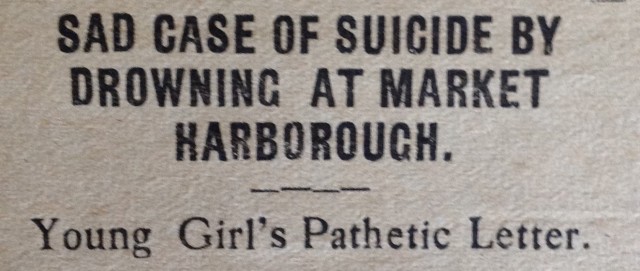
Widow Annie Clay has had her fair share of tragedy. Not only has she lost a husband, but one of her sons was killed in the fighting in France, another was so badly injured one of his legs was amputated, and her future son-in-law is missing in action.
Now, according to the June 4, 1918, edition of the Market Harborough Advertiser, she has more grief to bear. This time it is her 23-year-old daughter Lil, who has taken her own life by drowning herself in the town canal.
Annie, of King’s Head Place, Great Bowden, had to give evidence at the inquest into her daughter’s death, a report of which dominates page 3 of this week’s Advertiser.
Even over the distance of a hundred years the report, which carries the headline Sad case of suicide by drowning at Market Harborough – Young girl’s pathetic letter, makes poignant reading.
The facts of the story are simple: two soldiers were strolling along the canal towpath on Thursday when they saw the body of a fully dressed woman in the water. They pulled her out and called the police but she ‘was quite dead’.
The reasons behind the tragic story are less straight forward. At first it was thought Lil may have been upset because her soldier fiancé Frank had been missing in action for two months.
Although she was clearly upset by this huge question mark in her life it was something more prosaic that had tipped her over the edge.
As a corset hand on ‘piece work’ at Messrs R and W H Symington she had recently lost her job because she had ‘altered her book for two or three weeks by which she would draw about 18s more than she was entitled to’.
Apparently, despite being given a second chance, she had done the same again and when she had gone to work on Thursday morning she thought she had been discovered. The report says: “She got permission to leave the factory, went to an address at The Commons, borrowed a pencil, paper and stamp and wrote and posted a letter and must have then gone straight to the canal.”
The letter, which was sent to her mother and arrived just hours after her body was discovered, was read out to the inquest. It makes heartbreaking reading.
It begins: “My darling mother. I don’t know whatever you will think when this letter reaches you. I am nearly off my head.
“I have been altering my book at work for two or three weeks now. I don’t know what possessed me but it is want of money which is the cause of most trouble and I thought with a little more money what I could do for home and this is what it has brought me to.
“I shall have to end it all for I would not face the disgrace. To think that after all your troubles I should come to this.”
She continues: “I have no hopes before me but prison and I could not stand it. May God forgive me for this great trouble I am bringing upon you and God help you to bear it.
“Tell our George and Jack (poor boys to have such a sister) to be good boys to you and comfort you all they can. Goodbye all. May God help me and forgive me and help you to forget your sinful daughter. I was mad, real mad, I think, but money is a curse to some and so it has proved to me.”
She concludes her letter: “May God look after you all and pray for me as you have never prayed before. All my love to all of you from your penitent and heartbroken daughter. My poor Frank, if he is still living, but still if he were killed, I shall not be long after him.”
The coroner was told that although Lil would probably have been dismissed, there would have been no prosecution and she would not have gone to prison.
In a period in history when tragedy touches every family in the land, this story is, as the Advertiser’s editor sums up in the headline, ‘a sad case’.
The hearts of all those 1918 readers would, I am sure, have gone out to Annie Clay, a widow, who has now buried two of her children and is looking after another disabled son. My heart goes out to her too.
- This column is published every Monday by John Dilley on the Newspapers and the Great War website and will continue until the 100th anniversary of the final armistice in November 2018.
- My fellow researcher and De Montfort University lecturer David Penman is conducting a similar real-time project with the Ashbourne Telegraph. Check out his Great War Reports.
- Check out this week’s Harborough Mail for current news from the Market Harborough area.
Could you please let me know where I can get a copy of this article? Thank you.
Hi Claire – if you email me at johndilley17@gmail.com I can send you back a copy of the whole story